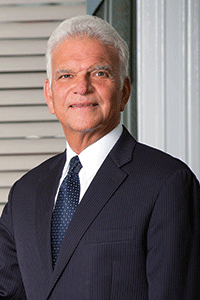CFO transformed finances of academic medical center
Dominic J. Puleo
CPA Executive vice president/
chief financial officer
Virginia Commonwealth University
Health System
Richmond
Urban hospitals, like the VCU Medical Center in downtown Richmond, face distinct challenges in the health-care industry, serving a large number of patients who are uninsured or underinsured and can’t afford medical care.
About 50 percent of VCU’s patients fall into one of these two categories, making it the largest single care provider for the uninsured and underinsured in the commonwealth.
While some health systems nationwide have moved their facilities to the suburbs to attract more insured patients, VCU Health System — with the help of CFO Dominic Puleo — has held steadfast in its mission to serve as a safety net health-care provider for patients in need.
During the 1990s, the VCU Health System was struggling to find a way to serve the community while remaining financially viable. But under Puleo’s leadership, VCU Health System has been transformed from an organization that was barely breaking even in 1999 to an integrated health system with more than $1 billion in annual revenue and a $100 million surplus last year.
Puleo, a Certified Public Accountant, helped turn around the VCU Health System by focusing on three areas: improving patient care, lowering treatment costs and increasing reimbursements from government-run Medicaid and Medicare programs.
“It’s a completely different organization than it was 10 years ago,” Puleo says. “The quality of our patient care and safety is some of the best in Virginia, even nationwide.”
VCU’s per-patient cost is well below the median of most academic medical centers in the country, officials say. One way VCU has brought down costs is by reducing unnecessary emergency-room visits. Through the Virginia Coordinated Care for the Uninsured program, emergency-room patients with routine conditions are referred to primary-care physicians in the region for follow-up care. VCU reimburses participating physicians for the care they provide, thereby limiting repeat ER visits and the higher costs associated with them.
“Dom has been absolutely brilliant in terms of sustaining a safety-net institution in the face of enormous challenges in a marketplace that’s highly competitive and resource intensive,” says Dr. Sheldon M. Retchin, the health system’s CEO. “He has helped us to fund the care of uninsured patients to ensure that the costs are not prohibitive, so we can sustain that mission.”
The health system’s improved financial condition has led to several major capital upgrades, including the addition of a $184 million critical-care hospital in 2008 and a $168 million Children’s Pavilion now under construction on East Broad Street. Once complete, the pavilion will be the largest outpatient children’s facility in the region.
Puleo managed the bond sales for both projects.
“I have worked closely with Dom Puleo on both financial and investment priorities,” says John Sherman, chair of the VCU Health System’s Finance Committee. “His knowledge, vision and work ethic continue to keep [the health system] on solid footing, helping lead to its No. 1 ranking [among Virginia hospitals on U.S. World and News Report’s Best Hospital list] recently.”
n
















